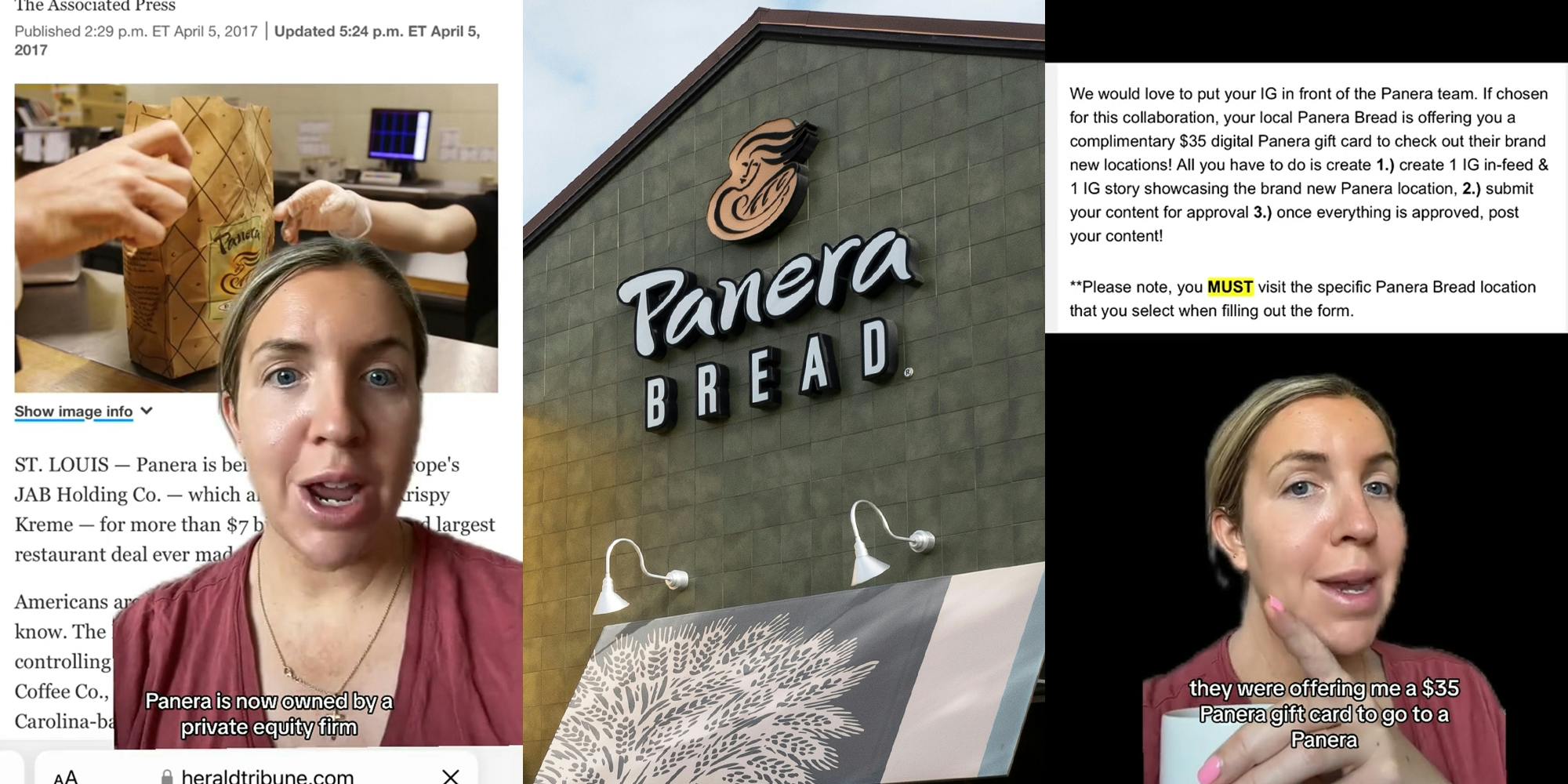
Meredith Lynch, a TikToker with over 230,000 followers, has previously talked about exploitative brand requests she’s received. But this time, she’s sharing the receipts.
What is a brand deal?
Brand deals, also known as brand partnerships, occur between influencers and/or creators and brands big and small. Sometimes, influencers are paid to make content about a brand; other times, they are gifted products and asked to post content about the products in exchange for receiving them for free.
As reported by Insider, some brands work with influences with less than 10,000 followers, so being a full-time content creator is within reach for many people. However, influencers, rely on brand deals to make a majority of their profit, so if they aren’t paid accordingly or fairly, they could be losing out on a chunk of their livelihood.
Panera Bread
Lynch first revealed the details of a brand partnership offer she received from Panera Bread.
On Wednesday, Lynch posted a TikTok in which she explains what representatives from Panera asked her to do in exchange for a $35 Panera gift card: Drive to a Panera location an hour away from her home, buy food from the location, film content with the food, edit the content, submit the content for approval from Panera, and then post the content on her Instagram story and feed.
“Basically, they’re asking you to create free advertising for them,” Lynch says in her TikTok. “A $35 gift card is nothing to them.”
Truly Beauty
A day later, Lynch shared another brand request that she says is “unhinged” from Truly Beauty, a skincare brand sold at Ulta and Target. The request is about the brand’s “TikTok Challenge,” which involves payment according to how many views videos of Truly Beauty products receive.
If a video receives a million views, creators are paid $2,000. Each additional million views gets creators another $1,000.
Lynch says the deal is a “scam” and feels like a multi-level marketing scheme because “it’s actually really not that easy to hit a million views on TikTok.” She explains that some of her videos have taken “years” to reach a million views—but Truly says for its influencer challenge, video views are counted after two months.
“That is also relying so much on the power of the algorithm,” Lynch says. “Which we as creators cannot control. We can’t guarantee views on something.”
The terms and conditions of Truly’s challenge also state that any content made as part of the challenge can be used and/or repurposed by Truly Beauty, which Lynch says—like Panera’s request—is free advertising.
“They know it’s going to be nearly impossible for anyone to get that million views,” Lynch says. “But they’re gonna get all your content and own it regardless of how many views it gets.”
In response to the Daily Dot’s request for comment, a Truly representative invited the reporter to apply for a partnership with the company.
Verb Products
Lynch’s next video is about Verb, a haircare company. She received an email about a new product, and the brand said it would like to send her a scalp product for her to try but that she wasn’t “obligated” to make content about it.
But when she asked to try the scalp product, she was sent shampoo instead. When she told Verb she received the wrong product, the company said it would send her what she initially agreed to receive—and asked if she’d first try the shampoo.
“That’s not what you were supposed to send me,” Lynch says in her video. “You were gonna send me something else.”
Verb clarified that the arrangement wasn’t paid; it was a gifting opportunity. Verb also asked requested Lynch to mention in any promotional content that the shampoo is available to buy at Sephora. Lynch says that she got multiple emails asking her if she’d tried the shampoo and never received the scalp product.
“This is what they do. They send you a product they have access [to] and then they’re like, ‘Oh well make content about that for us instead.'” Lynch says. “And then they just harass you.”
Pumiey
The final brand that Lynch speaks about was “shady” to a friend of hers who is also a content creator, she says. The brand, Pumiey, is a lesser-known shape-wear company. Lynch says her friend was doing a “paid partnership” with Pumiey and that her friend used the TikTok paid partnership tool to post the content.
Lynch says that her friend then received an email from Pumiey stating that it wouldn’t be paying her because she didn’t mention the brand name. But as Lynch shows in screenshots, her friend was specifically asked by Pumiey to not “mention any brand info.”
A representative for Pumiey also admonished the creator for using the TikTok brand partnership tool.
“They didn’t want her saying that it was a paid partnership,” Lynch says. “This is a brand actively telling people not to disclose the partnership piece of content they are creating.”
According to TikTok’s terms of service concerning promoting brands and products, creators “must turn on the content disclosure setting.”
“This ensures that you’re transparent about the type of content you’re posting,” TikTok states. “And helps build and maintain trust between TikTok users and advertisers.”
All in all, Lynch says that she thinks that the behavior of the brands she’s posted about is illegal.
“These companies are counting on us not information sharing,” Lynch says. “Let’s keep sharing these experiences we’ve had.”
The Daily Dot reached out to Panera Bread, Verb Products, and Pumiey.
Sign up to receive the Daily Dot’s Internet Insider newsletter for urgent news from the frontline of online.
Source: https://www.dailydot.com/irl/panera-brand-deal-scam/